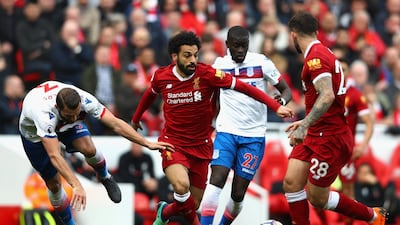During a 1988 FA Cup tie, a section of the crowd at Goodison Park, home to Liverpool's footballing rivals Everton, started throwing bananas onto the pitch. The asinine, racist taunt was aimed at John Barnes, one of the first black players to play in Liverpool's senior team. The lasting image of that day, however, was of Barnes coolly back-heeling a piece of fruit into touch before going on to create the goal that took Liverpool to victory. Liverpool went on to win the league that year and Barnes was named player of the year.
Barnes smashed prevalent racial stereotypes of the day, becoming a positive role model and by implication, an ambassador for tolerance. In my schoolyard kickabouts, everyone, regardless of skin colour, wanted to be Barnesy.
Thirty years later, Liverpool fans are now singing the praises of Mohamed Salah. The Egyptian footballer, known affectionately as Mo Salah, has quickly won the hearts of the city. Arab and Muslim, Salah represents several of the groups that have been negatively stereotyped and much-demonised in recent years. Salah and the Liverpool fans' adoration of him shatter those stereotypes.
The footballer's religion is an integral part of his identity. For example, when he scores goals, he performs sujood, the Islamic prostration performed during prayer. This is a voluntary act of devotion, thanking God for a perceived blessing. Salah isn't the only Muslim player to perform the gesture but his record-breaking goal count for this season (43 and still counting) makes it conspicuous by its frequency.
His religion and prolific goal-scoring are reflected in the songs the Liverpool fans sing about the star: "If he's good enough for you, he's good enough for me, if he scores another few, then I'll be Muslim too." This particular song is sung to the tune of the Britpop band Dodgy's 1994 hit Good Enough, making it particularly infectious. Salah, like many sportsmen and women before him, has become a role model.
Like it or not, young people – those still forming their identities – tend to make role models out of sports stars. Some sporting personalities, however, are reluctant to shoulder this responsibility. Charles Barkley, the US basketball legend, famously and controversially renounced his star status, saying: “I am not a role model. Just because I dunk a basketball doesn't mean I should raise your kids.” Unfortunately, role model status is not optional. Humans are mimetic. Many of us copy behaviours and absorb the values and attitudes of those we admire.
Psychologists have widely studied the nature and impact of role models. We know that we tend to make role models out of individuals perceived as being similar to us. We are also more likely to make role models out of people whom we see being rewarded, celebrated and praised.
The impact of role models can be positive or negative, based on the pro or anti-social behaviour and attitudes they promote. Among young people, however, having a positive role model seems to be associated with better mental health.
For example, data from the 2009 California Health Interview Survey (CHIS), a survey of about 50,000 Californians, found teens who looked up to athletes and sportspeople reported less hopelessness, worthlessness and depression than those teenagers with no role models at all.
A word of caution though: over-investment in sporting heroes can lead to profound disappointment and disillusionment. For example, if Lance Armstrong was your idol, how might you have felt when you discovered that performance-enhancing drugs assisted his seven consecutive Tour de France wins? And let's not forget OJ Simpson, who was an NFL player of the year before he was tried for the murder of his ex-wife Nicole Brown. He was acquitted but later found liable for her death in a civil action.
In contrast to many of those propelled into the limelight at a young age, 25-year-old Salah is reserved, appreciative and humble – all the qualities that make a truly great role model. He is more than good enough.


